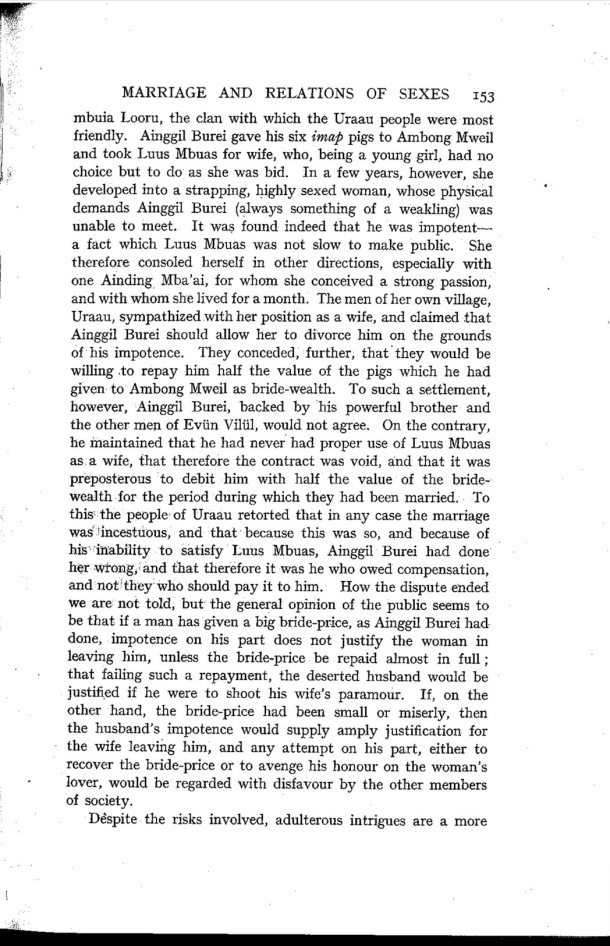|
|  [NOTE: this transcription was produced by an automatic OCR engine]
MARRIAGE AND RELATIONS OF SEXES 153
mbuia Looru, the clan with which the Uraau people were most
friendly. Ainggil Burei gave his six imap pigs to Ambong Mweil
and took Luus Mbuas for wife, who, being a young girl, had no
choice but to do as she was bid. In a few years, however, she
developed into a strapping, highly sexed woman, whose physical
demands Ainggil Burei (always something of a weakling) was
unable to meet. It was found indeed that he was impotent—~
a fact which Luus Mbuas was not slow to make public. She
therefore consoled herself in other directions, especially with
one Ainding Mba.‘ai, for whom she conceived a strong passion,
and with whom she lived for a month. The men of her own village,
Uraau, sympathized with her position as a wife, and claimed that
Ainggil Burei should allow her to divorce him on the grounds
of his impotence. They conceded, further, thatthey would he
willing to repay him half the value of the pigs which he had
given to Arnbong Mweil as bride-wealth. To such a settlement,
however, Ainggil Burei, backed by his powerful brother and
the other men of Eviin Viliil, would not agree. On the contrary,
he maintained that he had never‘ had proper use of Luus Mbuas
as a wife, that therefore the contract was void, and that it was
preposterous to debit him with half the value of the bride-
wealth for the period during which they had been married. To
this the people of Uraau retorted that in any case the marriage
wasiincestuous, and that because this was so, and because of
his‘inability to satisfy Luus Mbuas, Ainggil Burei had done
her wrong,-» and that therefore it was he who owed compensation,
and not'they'who should pay it to him. How the dispute ended
we are not told, but the general opinion oi the public seems to
be that if a man has given a big bride-pr-ice, as Ainggil Burei had-
done, impotence on his part does not justify the woman in
leaving him, unless the bride-price be repaid almost in full;
that failing such a repayment, the deserted husband would be
justified if he were to shoot his wife’s paramour. If, on the
other hand, the bride-price had been small or miserly, then
the husband's impotence would supply amply justiï¬Åcation for
the wife leaving him, and any attempt on his part, either to
recover the bride-price or to avenge his honour on the woman's
lover, would be regarded with disfavour by the other members
of society.
Despite the risks involved, adulterous intrigues are a more
-Z
|